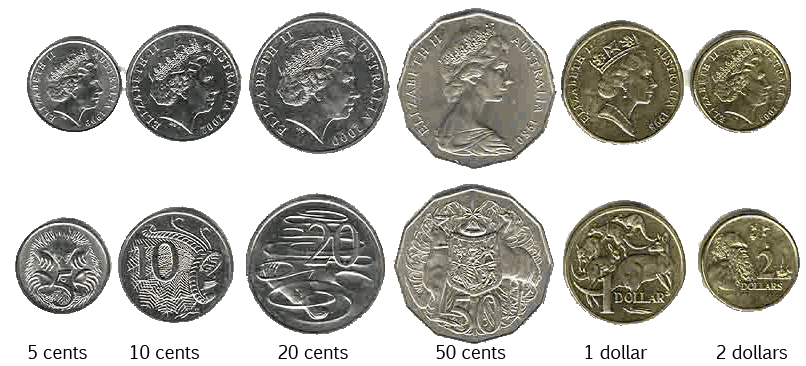Prekinder to Grade 2 Mathematics
World Currencies
World Currencies
If you've ever done any travelling, or your parents have done online shopping on overseas web sites, you'll know that many different countries use different currencies (money). In this article we're going to look at the money that we use, and the money that some other countries use. The list won't be complete as it would make the article too long, but I'll give you some links where you can find out about the money of a number of different countries, and this should give you an idea of how to search for information about the countries that I haven't included. A quick internet search will help you to find pictures of the money for just about any country in the world. Let's start with the money we use in Australia and New Zealand.
Australia
In Australia, like in many other countries, our basic unit of currency is the dollar. Each dollar is made up of \(100\) cents. The currency code for the Australian Dollar is AUD. Here are some pictures of our coins and bank notes:


New Zealand
Our neighbours across the Tasman also use a dollar. The New Zealand dollar is also made up of 100 cents. It has the currency code NZD. Many of the coins are quite similar to Australian coins, and you'll often end up with a few New Zealand coins in your wallet when you go shopping in Australia, or a few Australian coins in your wallet when you go shopping in New Zealand. Here are some pictures of New Zealand's bank notes and coins:


Canada
The Canadians also use a dollar that is made up of 100 cents. The currency code for the Canadian dollar is CAD. Here are some pictures of the Canadian bank notes and coins. Check out the nicknames they use for their coins! A loon is a native Canadian duck.


United States
The United States also uses a dollar that is made up of 100 cents. The currency code for the US dollar is USD. Here are some pictures of the United States bank notes and coins. They use similar nicknames to the Canadians for their coins. They also have a 2 dollar note and a hundred dollar note, but these are quite rare.


United Kingdom
The United Kingdom uses the Pound Sterling as their basic unit of currency. Each pound is made up of 100 pence. Here are some pictures of some of the United Kingdom's bank notes and coins. You can find more recent pictures of their coins on this webpage on the pound sterling.


Some Other Countries
Many European countries use the Euro as their currency. Each Euro is made up of 100 cents. The currency code is EUR.
South Africa uses the rand as its currency. Each rand is divided up into 100 cents. The currency code is ZAR.
Indonesia uses the rupiah as its currency. Each rupiah is divided up into 100 sen. The currency code is IDR.
Singapore uses the Singapore dollar as its currency. Each Singapore dollar is divided up into 100 cents. The currency code is SGD.
Malaysia uses the ringgit as its currency. Each ringgit is divided up into 100 sen. The currency code is MYR.
India uses the rupee as its currency. Each rupee is made up of 100 paisa. The currency code is INR.
China uses the yuan as its currency. Each yuan is made up of 10 jiao, or 100 fen. The currency code is CNY.
Japan uses the yen as its currency. Each yen is made up of 100 sen. The currency code is JPY.
There are many other currencies used throughout the world. Why not do an internet search and see if you can find some more?
Description
This mini book covers the core of Math for Foundation, Grade 1 and Grade 2 mathematics including
- Numbers
- Addition
- Subtraction
- Division
- Algebra
- Geometry
- Data
- Estimation
- Probability/Chance
- Measurement
- Time
- Money
- and much more
This material is provided free of cost for Parent looking for some tricks for their Prekinder, Kinder, Prep, Year 1 and Year 2 children
Audience
Grade 1/Year 1, Grade 2/Year 2, Prep, Foundation, Kinder and Pre-Kinder
Learning Objectives
These lessons are for kids aged 4-8 with the core objective to expose their brains to concepts of addition, subtraction, division, algebra and much more.
Author: Subject Coach
Added on: 6th Apr 2018
You must be logged in as Student to ask a Question.
None just yet!